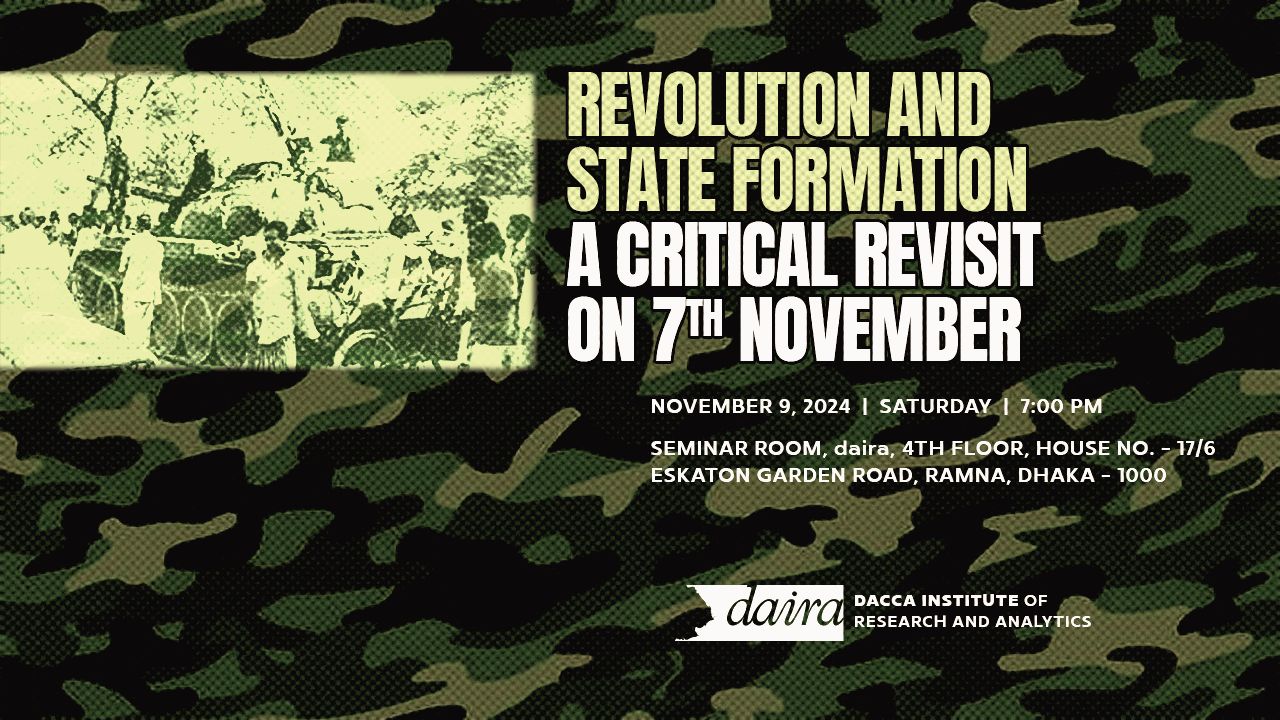Following the assassination of Sheikh Mujibur Rahman in 1975, Mushtaq Ahmed assumed the presidency, an outcome largely facilitated by the support of a faction within the military. While Mushtaq formally dissolved the Bangladesh Krishak Sramik Awami League (BAKSAL), elements of its ideological framework persisted in his governance. Although he declared the suspension of the Constitution, this suspension was selective, targeting specific articles while introducing limited amendments. Mushtaq’s accession to power, therefore, can be interpreted as an extension of BAKSAL’s foundational authority, albeit under altered circumstances. The transition from Mushtaq to Justice Abu Sadat Mohammad Sayem as President marked a significant turning point, influenced heavily by the military, particularly by Colonel Taher. Sayem’s tenure was characterized by governance under the implicit control of the armed forces, with certain constitutional provisions suspended, signaling a period of military-guided administration.
Revolution and State formation; A critical Revisit to 7th November
A discussion by S M Rezaul Karim
Following the assassination of Sheikh Mujibur Rahman in 1975, Mushtaq Ahmed assumed the presidency, an outcome largely facilitated by the support of a faction within the military. While Mushtaq formally dissolved the Bangladesh Krishak Sramik Awami League (BAKSAL), elements of its ideological framework persisted in his governance. Although he declared the suspension of the Constitution, this suspension was selective, targeting specific articles while introducing limited amendments. Mushtaq’s accession to power, therefore, can be interpreted as an extension of BAKSAL’s foundational authority, albeit under altered circumstances. The transition from Mushtaq to Justice Abu Sadat Mohammad Sayem as President marked a significant turning point, influenced heavily by the military, particularly by Colonel Taher. Sayem’s tenure was characterized by governance under the implicit control of the armed forces, with certain constitutional provisions suspended, signaling a period of military-guided administration.
The Bangladesh Nationalist Party (BNP) commemorates November 7 as the “Sepoy-People’s Revolution.” In actuality, this event was a coup orchestrated by Colonel Taher, which resulted in the release of Ziaur Rahman and set the stage for his eventual rise to power. Amid controversies surrounding electoral processes, Justice Sayem resigned from the presidency, transferring authority to Ziaur Rahman. In his autobiography, Sayem described this power transfer as peaceful, recounting that he summoned Zia to Bangabhaban and directly inquired whether Zia sought power. Zia’s assurance to hold elections ostensibly facilitated this transition. While Sayem referred to parliamentary elections, his administration oversaw the organization of a presidential election, adding a layer of complexity to this period. The ideological and strategic divergence between Zia and Colonel Taher was pronounced. Taher, a Marxist revolutionary, envisioned a politically democratic socialist state, while Zia, emerging from a military background, pursued a pragmatic, development-oriented capitalist approach. Taher’s revolutionary ambitions failed, allowing Zia to consolidate his position at the center of power through calculated strategies.
Before formally establishing the BNP, Ziaur Rahman leveraged local government elections as a platform to unify politicians from diverse ideological and political backgrounds. This coalition, which integrated various political perspectives, was pivotal in Zia’s political ascendancy and in shaping a governance model focused on pragmatism and economic development. Officers in the Bangladesh Army were predominantly trained in Pakistan, where the military espoused the belief that civilians were inherently unfit to govern. However, the Liberation War of 1971 catalyzed a shift in this perspective, gradually instilling the notion that civilian governance is more appropriate for managing state affairs. Figures like Colonel Taher played a pivotal role in challenging the entrenched belief that the military was best suited for governance, thereby initiating a reconfiguration of civil-military relations in post-independence Bangladesh.
The regimes of Ziaur Rahman and Hussain Muhammad Ershad were marked by contrasting approaches to balancing military influence and democratic governance. Zia, in a symbolic move, stepped down as Chief of Army Staff before contesting the 1978 presidential election, signaling a deliberate attempt to detach his political initiatives from direct military involvement. Conversely, Ershad retained his position as Chief of Army Staff even after assuming the presidency, effectively intertwining military authority with political leadership. This divergence illustrates two distinct models of governance: Zia’s approach sought a separation of military and political spheres, while Ershad’s presidency relied heavily on the institutional support of the armed forces. The assertion that the BNP was “born in the cantonment” oversimplifies the complexities surrounding its inception. While the military’s influence cannot be ignored, the party’s formation reflected broader political strategies aimed at unifying fragmented political forces. Critics often delegitimize such parties by branding them as “king’s parties,” echoing the rhetoric used to undermine student-led or military-affiliated political organizations. Yet, historical precedents such as the Indian National Congress, the All-India Muslim League, and even the Awami League—an offshoot of the Muslim League—demonstrate similar origins tied to institutional and leadership dynamics. The critical question lies not in moral positioning but in the capacity to enact meaningful political reforms while in power.
The rigidity of Bangladesh’s Constitution poses a significant barrier to such reforms. Its entrenched provisions render it practically unchangeable, creating a paradox where constitutional continuity hinders necessary amendments. Both student leadership and the BNP lack a unified stance on constitutional reform, exacerbating the challenges of institutional transformation. The BNP’s primary concern is the uncertainty surrounding the electoral process, particularly fears that the government may exploit ambiguities in the electoral roadmap to delay elections and prolong its tenure. To address these apprehensions, confidence-building measures are essential. Transparent local government elections and the appointment of legitimate candidates to administrative positions could serve as initial steps in restoring trust. Additionally, addressing the BNP’s concerns regarding potential military and administrative biases is crucial for fostering a collaborative environment.
If student leaders, the government, and opposition parties can engage in meaningful negotiations, pathways for a new constitution and electoral reforms could emerge. Such collaboration would not only help resolve the current political impasse but also lay the foundation for a more inclusive and democratic governance framework in Bangladesh.


